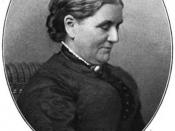Death is an inescapable part of every life. For some it is a quick and nearly painless occurrence, while others arenÃÂt so lucky. Many people would rather end their life than be forced to endure the pain required for them to live. In some cases, this is where euthanasia comes in. According to the American Heritage Medical Dictionary, euthanasia is ÃÂthe act or practice of ending the life of an individual suffering from a terminal illness or an incurable condition, as by lethal injection or the suspension of extraordinary medical treatment.ÃÂ By this definition, euthanasia would allow the option of a painless death to a person who is already dying. Someone who is already dying and is in pain should have the option to end their life if they should choose. Euthanasia should be legalized because with set criteria to be met, euthanasia would be made into an ethical option, it would be made into a safe procedure, and because a personÃÂs rights in life should also include their death.
Euthanasia would be ethical with mandated criteria. One of the main issues with euthanasia is its clash with some peopleÃÂs morals or ethics. In the Netherlands, euthanasia was made legal by the Dutch Euthanasia Act in 2002. In accordance to this, euthanasia is completely legal, but only if the patientÃÂs request was voluntary and well considered, they are completely informed of their situation, there are no reasonable alternatives, their suffering is unbearable and hopeless, a different doctor was consulted, and the method is appropriate. Also, it is necessary that the patient meet with a psychiatrist or psychologist if there is a possibility of mental instability or depression before the act of euthanasia is carried out. This way, any euthanasia request that was based off of depression or is deemed unnecessary or inappropriate in any other way can be avoided. Also, it means that a truly suffering person can maintain their dignity and put a stop to their pain.
Legalizing euthanasia would make it a safer option. Even though it isnÃÂt currently legal in thirty-six states, euthanasia is still occurring across the country, it is just going on behind closed doors. When it gets to this point, however, many factors get overlooked and ethical lines are crossed. ÃÂIn many cases, doctors and nurses miscalculated the dosages required to achieve death and resorted to panic in suffocation, strangulation, and injections of air in their desperate efforts to finish the job,ÃÂ says Magnusson. In order to get the drugs used in euthanasia, one method used is often theft. Many doctors admitted to lying about symptoms to explain the prescription or the administering of climbing dosages prior to the patientÃÂs death. (Magnusson) If euthanasia was legal and requirements were in place, all of the deceit and these dangerous occurrences could be avoided.
Personal rights in life should also extend to death. If a person were in constant, agonizing pain, they should have to choice to end it. Physician-assisted suicide is legal in certain cases because of a patientÃÂs right to refuse treatment, which can result in the patientÃÂs death. The difference between physician-assisted suicide and euthanasia is the physicianÃÂs role. In euthanasia, the doctor would be the one giving the lethal injection or other method, while in physician-assisted suicide, the doctorÃÂs role isnÃÂt as direct. In a physician-assisted suicide, the doctor would be the one to write the lethal prescription, but it is the patient who would actually be taking the lethal dose. It should be a personÃÂs right to end their own life if they are dying and in constant pain. If wouldnÃÂt be fair to force them to endure it and just prolong an inevitable death.
There are some who disagree with euthanasia, saying that it is morally wrong and that no one should be allowed to end another personÃÂs life. Such people say that euthanasia is ÃÂplaying God.ÃÂ However, the choice is made completely by the patient. If a dying person who is in chronic pain decides that they want to end their life peacefully and sooner rather than later, they should have that choice. Their quality of life wouldnÃÂt be very good and definitely wouldnÃÂt increase by putting off their death. Also, ÃÂplaying GodÃÂ refers to deciding when it is someoneÃÂs time to go, but the doctor doesnÃÂt decide that in euthanasia, the patient does. The doctor simply provides the means by which the patient ÃÂgoes.ÃÂPeople are diagnosed with terminal illnesses all the time. These people fight for everyday that they are alive. They also have to endure more pain, emotional and physical, than most of us have to deal with in a lifetime. When their days are numbered and that number gets smaller and smaller, a painful death is surely on its way. However, if that person could leave this world on their own terms and in a painless way, wouldnÃÂt that be preferable? In the words of Timothy Quill, ÃÂWhen death is the only way to relieve suffering, and inevitable regardless, why not allow it to come in the most humane and dignified way possible?ÃÂWorks CitedQuill, Timothy E. Death and Dignity: Making Choices and Taking Charge. New York, NY: W. W. Norton & Company, Inc., 1993.
Magnusson, Roger S. ""Underground Euthanasia" and the Harm Minimization Debate". The Journal of Law, Medicine & Ethics. 1 Oct 2004.
"Euthanasia". The American Heritage Dictionary of the English Language, Fourth Edition. Boston, MA: Houghton Mifflin Company, 2000.





